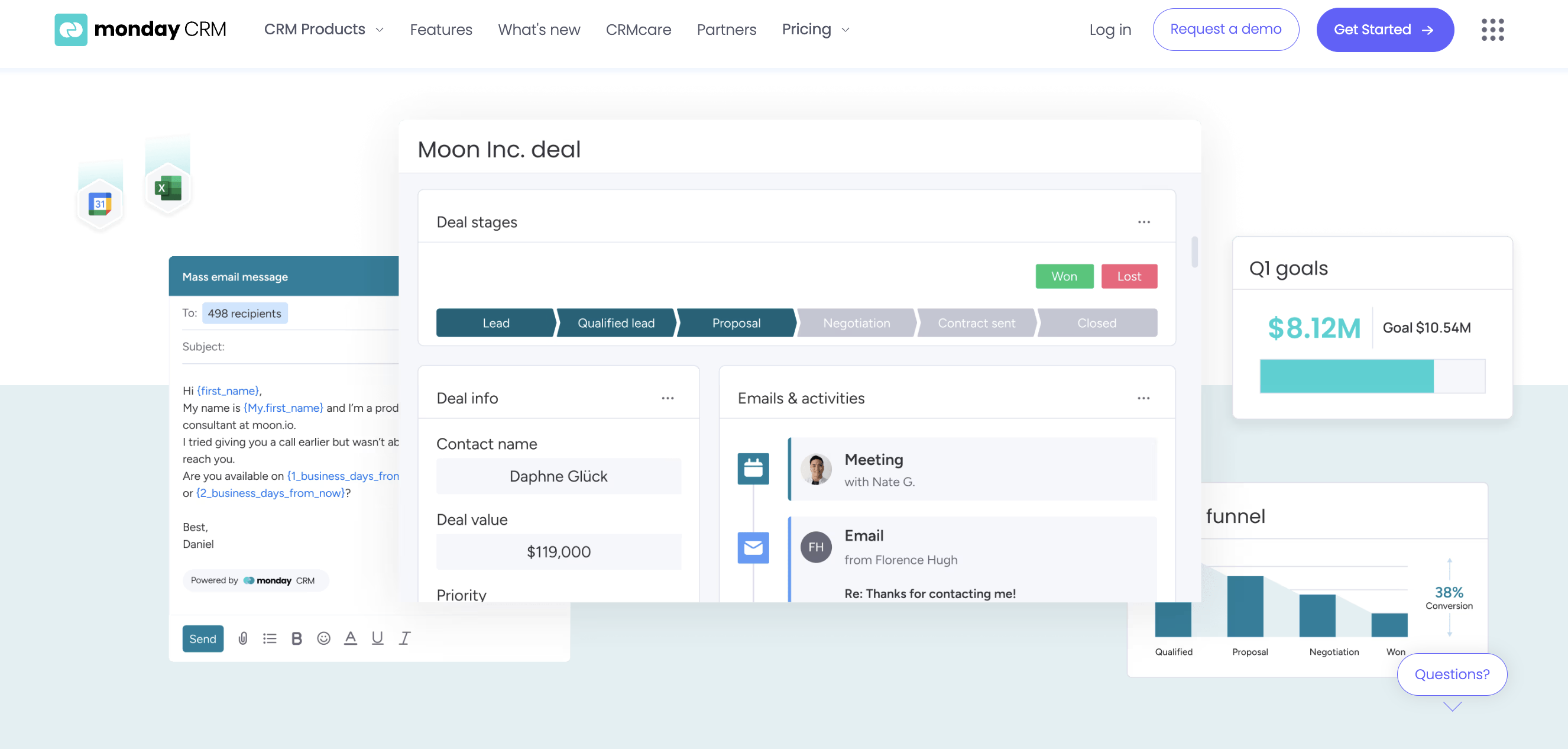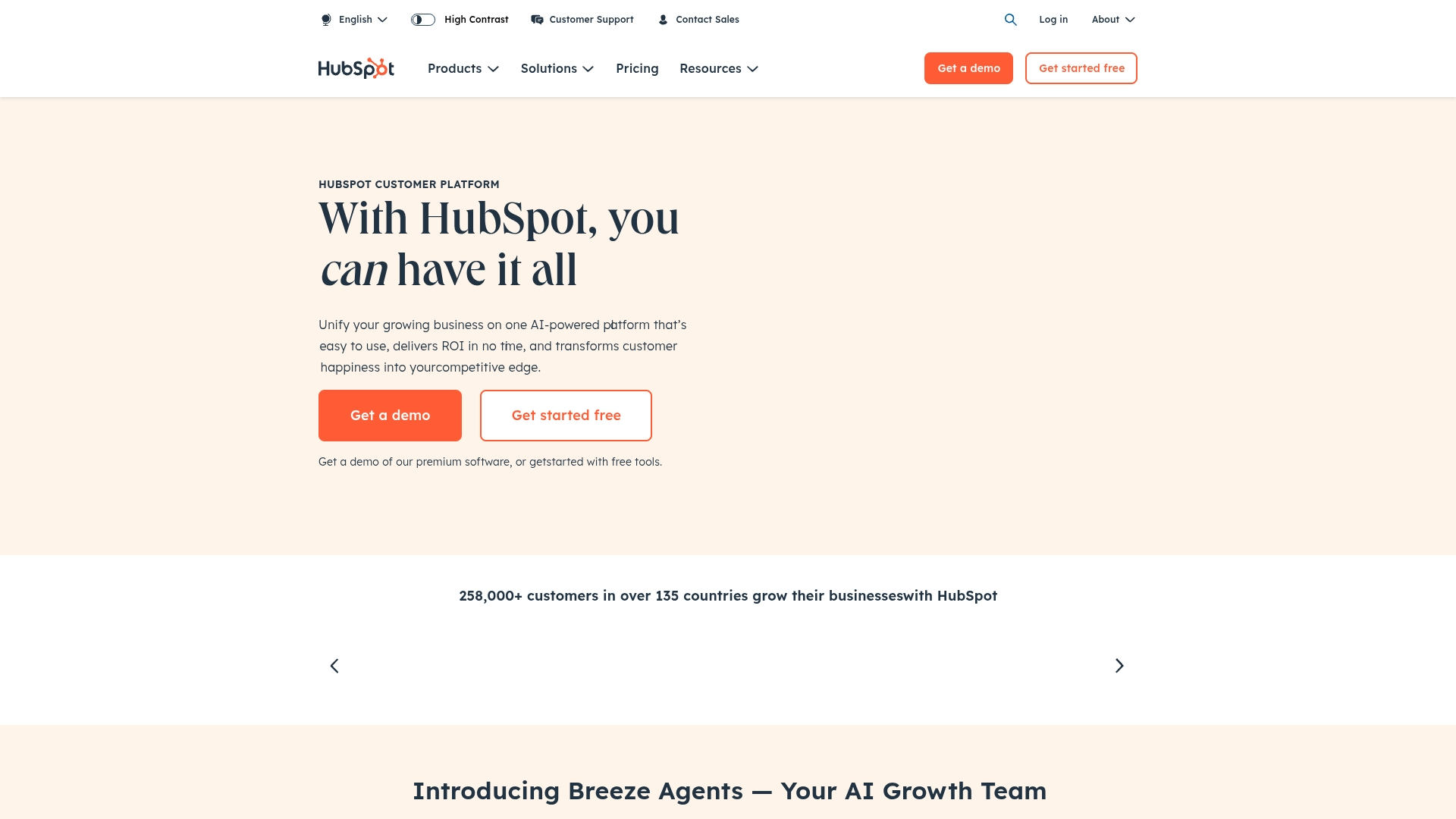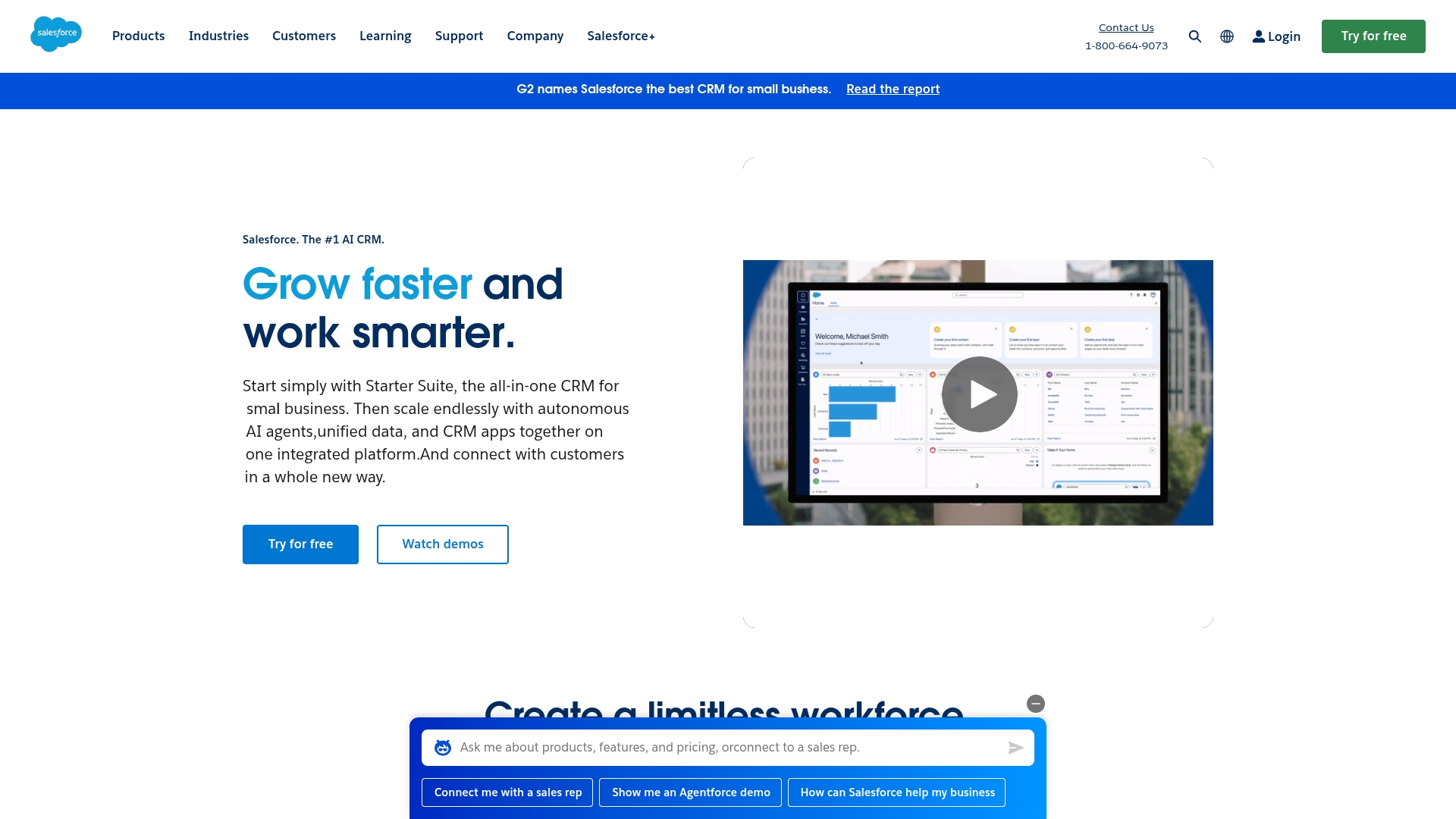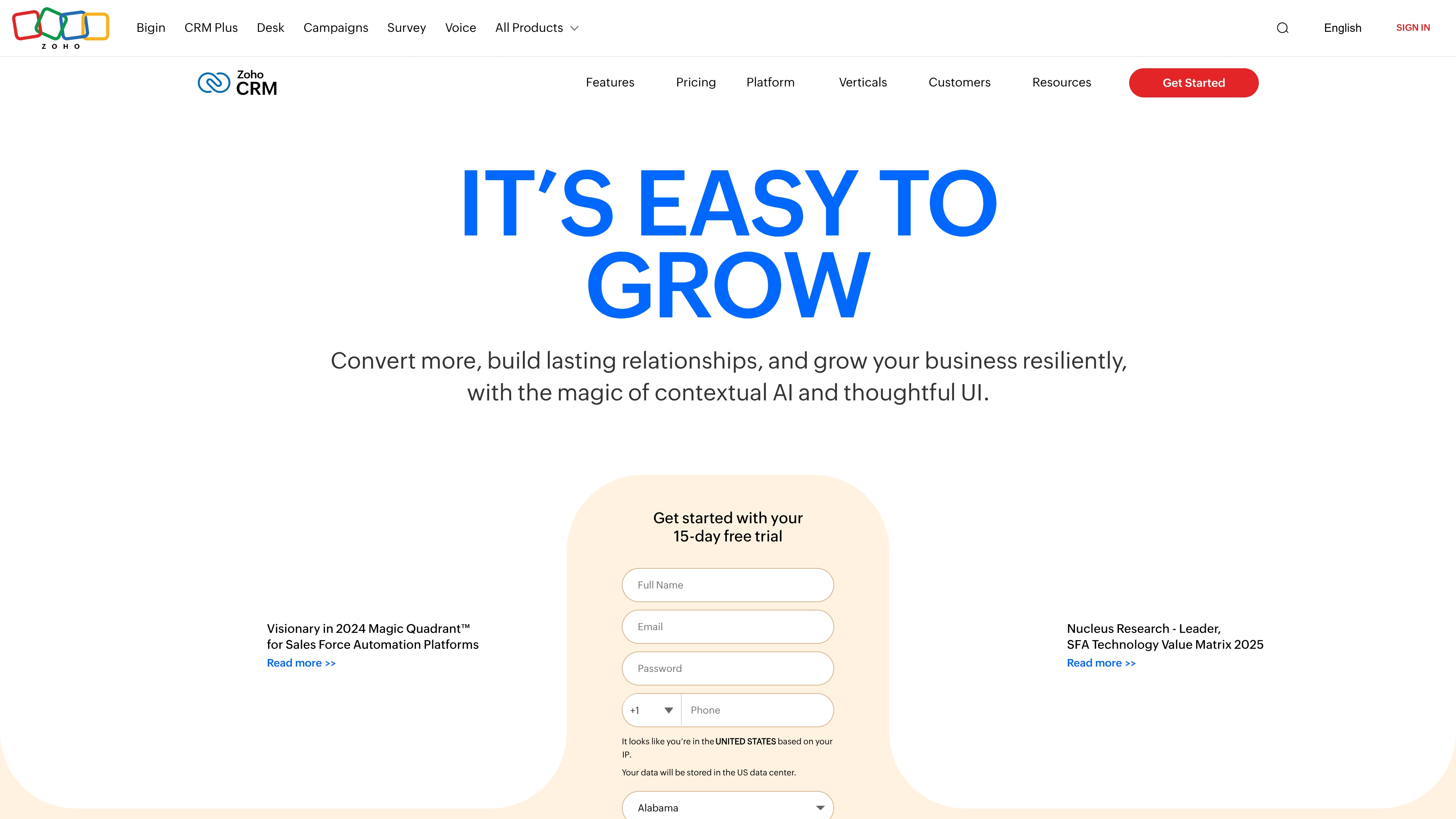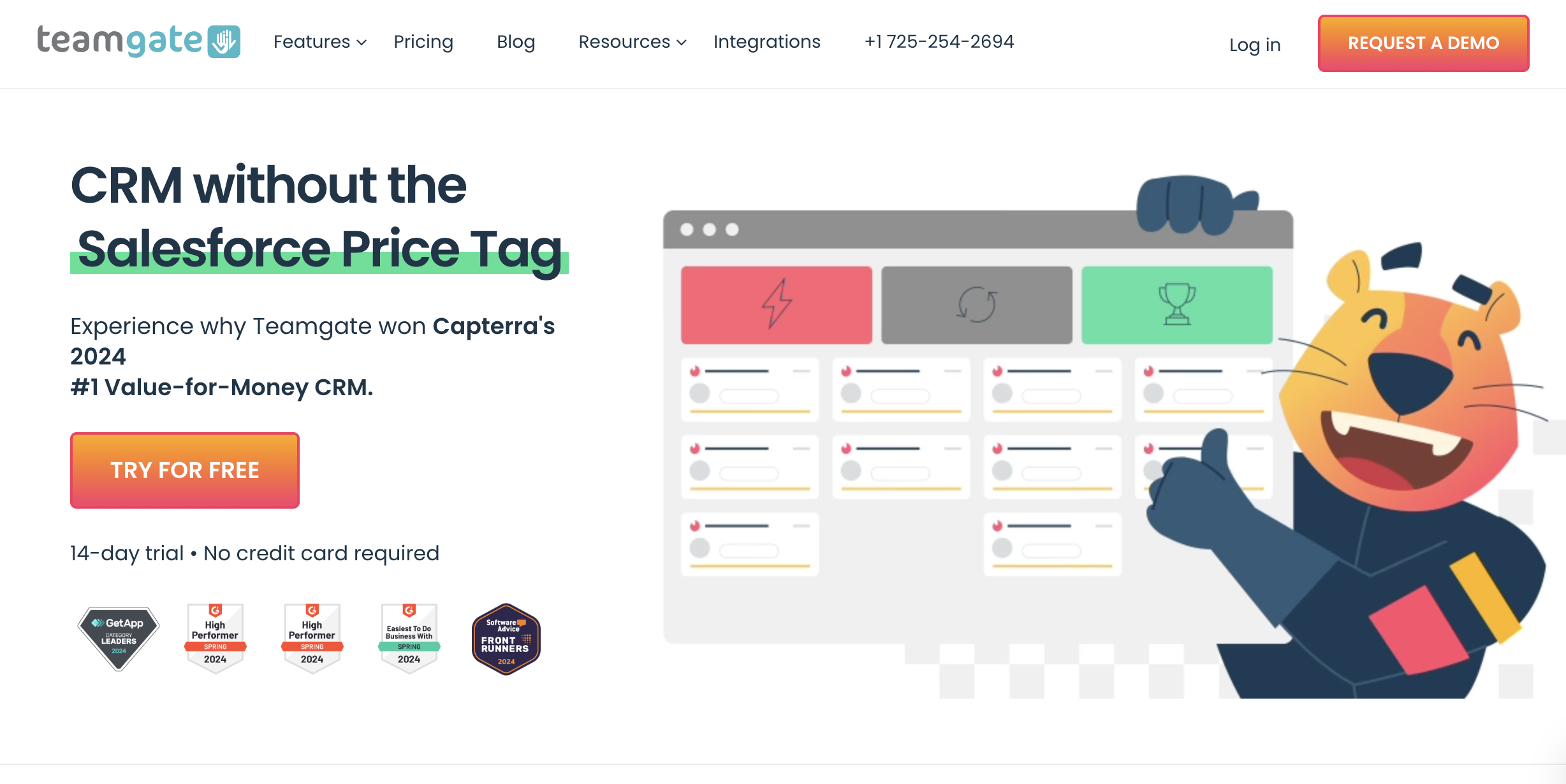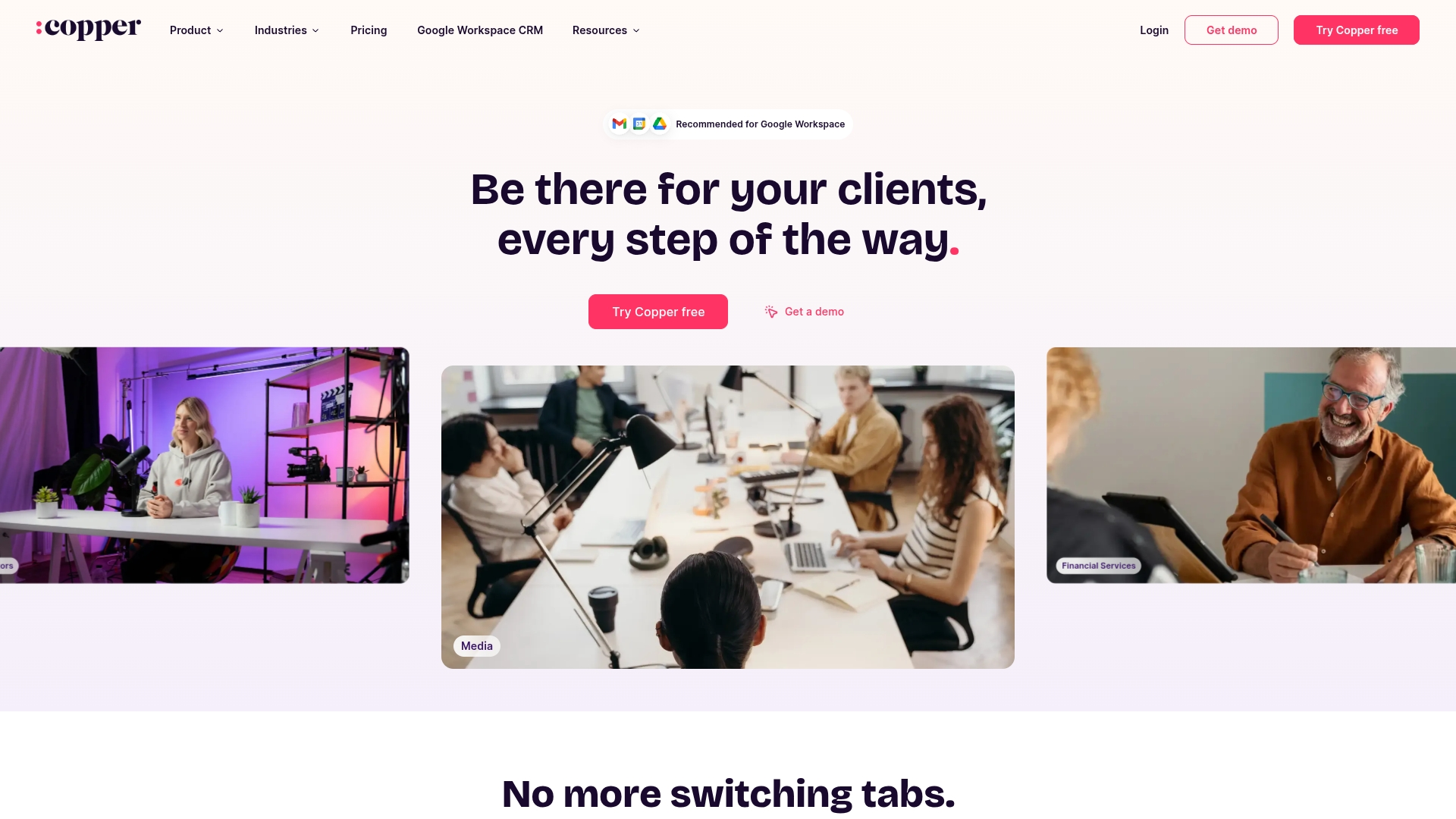A sales team’s success depends on momentum. When reps get stuck doing administrative work or searching for customer information, they lose the rhythm that helps them close deals. The right sales management software gets your team back in sync by automating tasks, leveraging AI for smarter insights, and organizing all your data in one place.
A flexible platform gives you the visibility and control to build a process that helps your team perform at its best. This guide covers what to look for in a sales platform, explores 7 key features that make a real difference, and compares the 12 top sales tools available today (including monday CRM) to help you make a confident choice. We’ll walk through how to transform your sales process, giving your team the alignment and confidence to close more deals.
Try monday CRMWhat is sales management software?
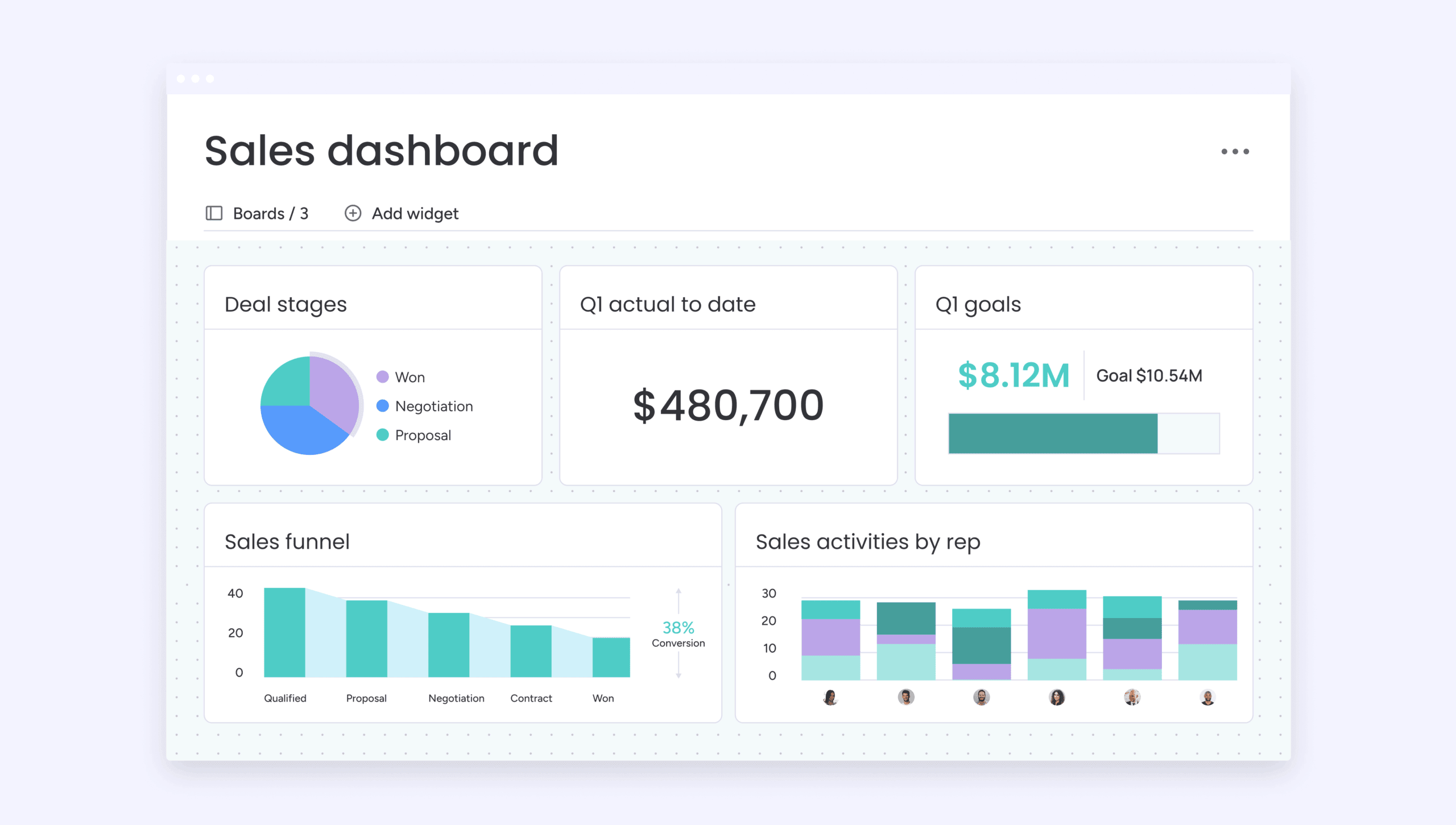
Sales management software serves as a team’s central command center, transforming the chaos of sales activities into a clear, confident strategy. It organizes all customer data and activities, providing a comprehensive, at-a-glance view of the entire pipeline. This process transforms scattered spreadsheets and notes into a unified strategy for hitting targets.
Its most significant advantage is reclaiming a representative’s most valuable asset: time. By automating the repetitive tasks that drain energy, your team is free to focus on what truly matters: building relationships and closing more deals. The goal is to help your team work smarter, so they can crush their goals with less friction.
A platform like monday CRM excels in this area because it’s built to adapt to your team’s unique process, not the other way around. You get an intuitive platform your team will actually want to use, giving them the confidence to perform at their best. For managers, this means complete visibility and control to steer the team to victory.
Who uses this platform and why it matters
An entire revenue team — from sales managers and RevOps specialists to BDRs — relies on a unified playbook to drive growth. A great CRM brings the whole team together, giving everyone a clear view of the field so they can move in sync. It is the central digital workspace for anyone accountable for hitting those ambitious growth targets.
Every member of the team has a critical function, and the right tools are essential for executing their part of the strategy. Sales managers get the instant pipeline visibility they need to coach their team effectively, while RevOps can finally forecast with confidence and keep the whole operation running smoothly. This isn’t just about tracking deals; it’s about empowering every person to do their best work.
Teams often make the switch when their existing systems start creating bottlenecks with manual work and siloed information. We believe your CRM should adapt to your unique sales process, giving you the flexibility and control to run your plays your way.
Try monday CRM7 key features that transform your sales team
The true value of a CRM isn’t found in flashy dashboards but in its ability to solve the real-world friction that slows down deals and frustrates top performers. We’re focused on features that directly lead to more wins.
The design philosophy behind monday CRM is that tools should adapt to the team, not the other way around. These seven capabilities are designed to make your sales process faster, smarter, and more predictable. They transform your team from reactive firefighters into strategic deal-closers.
1. Pipeline management
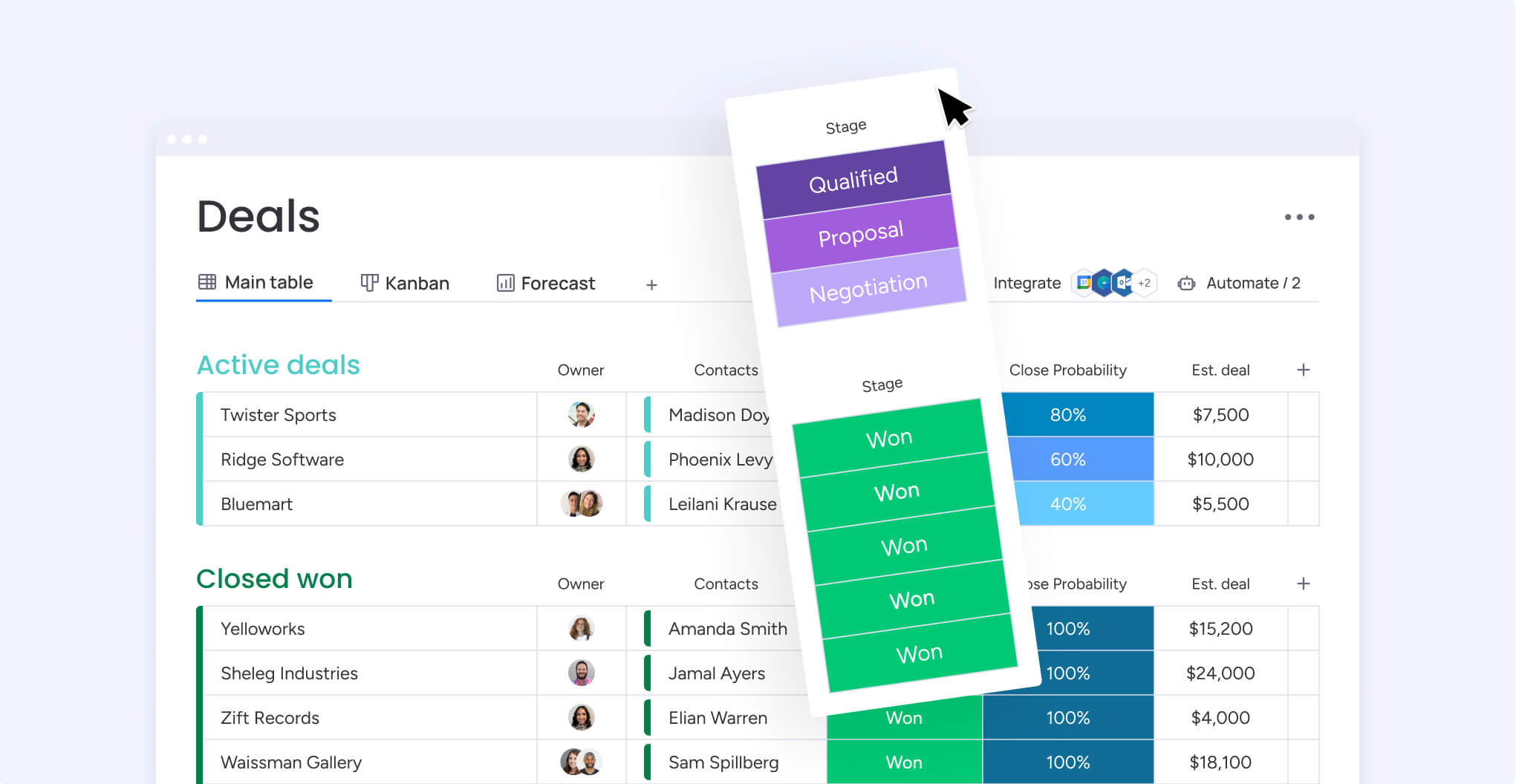
A winning team needs to see the entire field, and our visual pipeline gives you that complete visibility. With intuitive drag-and-drop stages, your reps can track progress effortlessly, while you spot bottlenecks before they ever threaten your forecast. It’s built to adapt to your unique sales cycle, from quick wins to long-term enterprise plays.
This clarity empowers your team to act decisively instead of guessing what’s next. We turn pipeline management from a chore into a strategic advantage, giving you the confidence to build a truly predictable revenue engine.
2. Automations and AI
Smart automation and AI-driven suggestions give your reps their most valuable hours back.Our no-code engine handles the repetitive but crucial processes like follow-ups and lead scoring, freeing your team to focus on building relationships and closing deals.
We take it a step further with AI that acts like a personal sales coach for every rep, helping write emails and suggesting the next best move. It’s the perfect blend of power and simplicity, an assistant your team will actually love using.
3. Real-time reporting and analytics
Stop managing your team from last month’s playbook. Our real-time dashboards translate raw data into clear, actionable insights, giving you an immediate pulse on performance, conversions, and revenue projections.
When your entire team sees the score in real time, data-driven stops being a buzzword and starts being how you win. Everyone stays aligned on the goal, making it easier to coach reps and make strategic adjustments while it still counts.
4. Contact and lead organization
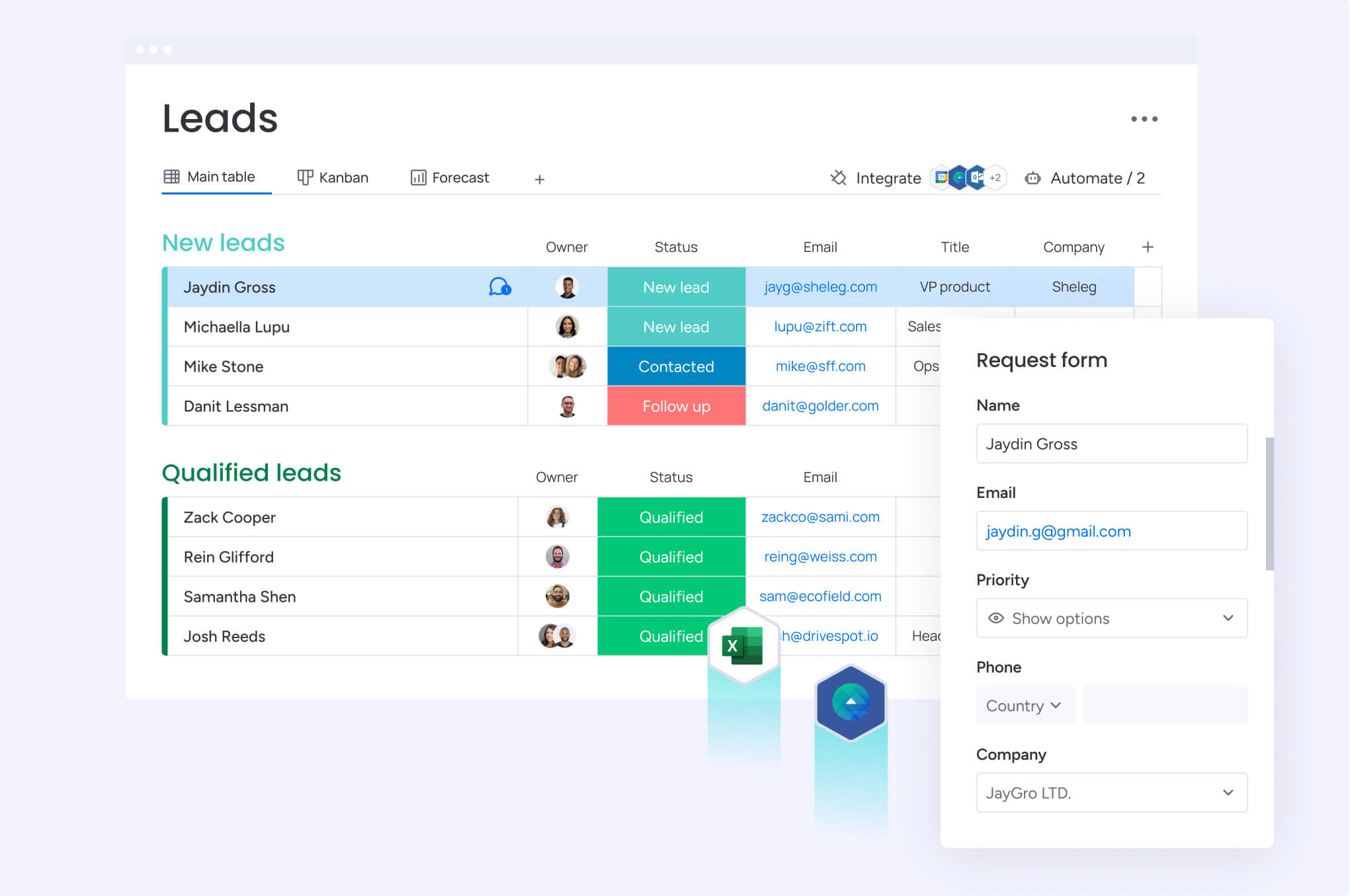
A CRM should function as the team’s collective memory, a single source of truth that eliminates the silos that kill deals. Every interaction, email, and note is captured automatically, creating a complete customer story that anyone on the team can access instantly.
This empowers reps with instant access to information, making every customer interaction confident and decisive. Smooth handoffs become the norm, building stronger customer relationships from the very first touchpoint.
5. Collaboration and team visibility
Closing a deal is a team sport that often involves marketing, success, and leadership. monday CRM breaks down the walls between departments, giving everyone the shared context they need to deliver a seamless customer experience.
When your teams work together instead of in isolation, you get faster problem-solving and a unified voice for your customer. It’s how you build trust and loyalty that lasts long after the deal is signed.
6. Mobile and remote access
Your team’s best work doesn’t just happen at a desk, and your CRM shouldn’t be chained to one either. Our mobile app keeps your remote and field sales teams connected and productive, whether they’re in a client’s office or on a plane.
Reps can update deals, access customer info, and keep momentum going from anywhere — even offline. Your sales process works wherever your team is, ensuring no opportunity is missed.
7. Integration with existing tools
A great CRM should be a team player, not a dictator of your tech stack. This flexibility allows you to adopt our platform at your own pace, making it the central hub of your sales operations, not just another siloed tool. We connect everything, so your team can focus on what matters.
Try monday CRM12 best tools for sales management in 2025
Selecting the right sales management tool is a critical decision, but it doesn’t have to be a gamble. We’ve compiled a list of top tools that don’t just manage your sales process — they transform it, giving your team the competitive edge they need to close more deals. Take a look at the quick comparison table and then dive deeper into each software to see how they compare.
| Platform | Use case | Free plan? | Notable feature | Starting price |
|---|---|---|---|---|
| monday CRM | Growing teams needing customizable, visual sales pipelines and automations | Yes | No-code customization & AI-powered workflows | $9/seat/month |
| HubSpot | Midsized businesses wanting all-in-one CRM + marketing ecosystem | Yes | AI-powered prospecting & guided selling | $20/seat/month (Starter) |
| Salesforce | Enterprises managing complex global sales operations | No | Einstein AI for lead scoring & forecasting | Custom pricing |
| Pipedrive | SMBs wanting a simple, visual, activity-based pipeline | No | Drag-and-drop visual pipelines | $14/user/month |
| Zoho CRM | Budget-conscious teams needing scalable automation + AI | Yes | Zia AI for predictions & lead scoring | $14/user/month |
| Freshsales | Modern teams needing AI scoring + built-in communication | Yes | Freddy AI for insights & predictive forecasting | $9/user/month |
| Close | Outbound teams doing high-volume calling, SMS, and email | No | Built-in dialers & AI-powered call assistant | Custom pricing |
| Insightly | SMBs needing CRM + project management integration | No | Deal-to-project conversion | $29/user/month |
| Nutshell | SMBs wanting CRM + email marketing in one | No | Next Action Selling methodology | $13/user/month |
| Keap | Small businesses needing CRM + automation + payments | No | Built-in invoicing & payment processing | $249/month (2 users) |
| Teamgate | B2B teams wanting affordable, intuitive CRM with dialing & analytics | Yes | SmartDialer & advanced lead scoring | $39.90/user/month |
| Copper | Google Workspace–centric businesses needing Gmail-native CRM | Yes | Automatic data capture from Gmail & Calendar | $9/user/month (Starter) |
1. monday CRM
Transforming sales management means having a platform that brings together visual pipeline tracking and no-code customization, adapting seamlessly to any sales process. Teams of all sizes can centralize customer data, automate repetitive tasks, and gain real-time visibility into deal progress — no technical expertise required. Built on the monday.com Work OS foundation, this solution connects sales activities with broader business operations for true cross-functional alignment.
Use case: Growing teams that need a customizable, easy-to-use CRM that adapts to unique sales processes while connecting sales, marketing, and operations
Key features
- Customizable deal pipelines and automated lead nurturing ensure every opportunity moves smoothly from first contact to closed-won
- Real-time sales dashboards and dynamic reporting give sales managers instant visibility into pipeline health, team activity, and revenue forecasts
- Integrated collaboration tools and automated notifications keep everyone on the same page
Pricing
- Free: $0 forever for up to 2 seats with basic features
- Basic: $9/seat/month with unlimited items and 5GB storage (minimum 3 seats)
- Standard: $12/seat/month with timeline views and 250 automations
- Pro: $19/seat/month with advanced features and 25,000 automations
- Enterprise: Custom pricing with enterprise-scale capabilities
- Annual billing saves 18% compared to monthly plans
Why it stands out
- Extreme customization without coding lets teams tailor every aspect of their sales process
- Visual, color-coded interface makes pipeline management intuitive for any skill level
- Seamless integration with the broader monday.com Work OS connects sales to marketing, project management, and operations
Advanced AI features
- Leverage AI to automate data analysis and generate tailored content, so your team spends less time on manual work and more time selling
- monday CRM’s AI assistant categorizes leads, extracts key details from emails, and crafts personalized follow-up messages that keep conversations moving forward
- Smart automation suggestions continuously learn from your team’s workflow, recommending process improvements that save time and eliminate repetitive tasks
Automations and integrations
- Leverage 250+ no-code automation recipes to streamline lead scoring, follow-up workflows, and data sync across boards
- Connect seamlessly with top sales and marketing tools (like Salesforce, HubSpot, Mailchimp, and Zapier)
- Open API and native integrations to sync data with email, marketing automation, and business intelligence platforms for true cross-functional alignment
2. HubSpot
HubSpot Sales Hub is a favorite for growing companies that want an all-in-one solution combining CRM, sales engagement, and marketing tools. Its AI-powered sales prospecting software features and guided selling features make it especially strong for scaling revenue teams.
Use case: Midsized businesses that want an all-in-one CRM and marketing ecosystem with AI-powered automation to accelerate predictable growth
Key features
- AI-powered prospecting agents and guided selling workspace that surfaces priority leads and deals with smart action recommendations
- Comprehensive sales automation including email sequences, call tracking, meeting scheduling, and document management with engagement analytics
- Advanced analytics and forecasting capabilities with conversation intelligence and customizable reporting dashboards
Pricing
- Free: Contact management, deal pipeline, quotes, live chat, meeting scheduling
- Starter: $20/month per seat (billed annually) – adds sales automation, goals, content analytics, payments, task queues
- Professional: $100/month per seat (billed annually) – adds prospecting workspace, sequences, forecasting, custom reporting, playbooks
- Enterprise: $150/month per seat (billed annually) – adds custom objects, predictive lead scoring, conversation intelligence, recurring revenue tracking
Considerations
- Significant price jump between Starter and Professional tiers can be costly for growing teams
- Advanced customization options are limited compared to enterprise-focused platforms like Salesforce
3. Salesforce
Salesforce Sales Cloud is the enterprise standard for complex organizations that need deep customization, advanced analytics, and powerful automations. It’s built to handle global teams, intricate workflows, and high-volume pipelines at scale.
Use case: Enterprise organizations managing large, complex sales operations across multiple regions, needing deep customization and advanced forecasting
Key features
- AI-powered lead scoring and relationship insights through Einstein platform to prioritize high-value opportunities
- Comprehensive pipeline management with customizable deal stages and real-time forecasting capabilities
- Extensive automation for routine tasks including email follow-ups, data entry, and cross-team collaboration workflows
Pricing
Custom pricing available upon request.
Considerations
- High implementation costs starting around $25,000 plus ongoing subscription fees can strain budgets for smaller organizations
- Steep learning curve requires dedicated admin resources and specialized expertise to fully leverage the platform’s extensive capabilities
4. Pipedrive
Pipedrive transforms sales management with its visual pipeline approach that puts deals front and center. Built by salespeople for salespeople, the platform specializes in an activity-based selling methodology, making it ideal for small to medium teams that want powerful functionality without the complexity.

Key features
- Visual sales pipeline with drag-and-drop deal management across customizable stages
- Activity-based selling approach that tracks calls, emails, and meetings to drive deal progression
- Workflow automation for follow-ups, reminders, and repetitive administrative tasks
Pricing
- Lite: $14/month per user (billed annually)
- Growth: $39/month per user (billed annually)
- Premium: $49/month per user (billed annually)
- Ultimate: $79/month per user (billed annually)
- All plans include a free 14-day trial
- Add-ons available starting from $6.70–$41 per company
Considerations
- Limited advanced functionality compared to enterprise-level CRMs like Salesforce
- Email marketing capabilities are basic and may require third-party integrations for comprehensive campaigns
5. Zoho CRM
Zoho CRM stands out for its balance of affordability and robust functionality. With AI-driven insights from Zia and a large ecosystem of business apps, it’s a strong option for organizations that want a scalable platform without a steep price tag.
Use case: Budget-conscious businesses that want a scalable CRM with strong automation, AI insights, and access to Zoho’s larger business app ecosystem
Key features
- AI-powered lead scoring and sales predictions through Zia assistant
- Blueprint process builder for creating custom sales workflows and automations
- Multi-channel communication hub with built-in telephony, live chat, and email integration
Pricing
- Free Edition: Free for up to 3 users with basic lead management software features and mobile apps
- Standard: $14/user/month (billed annually) with mass email, workflows, and sales forecasting
- Professional: $23/user/month (billed annually) including Blueprint, inventory management, and Google Ads integration
- Enterprise: $40/user/month (billed annually) with Zia AI assistant, territory management, and advanced customization
- Ultimate: $52/user/month (billed annually) featuring enhanced AI capabilities and unified business insights
- Team Users add-on: $9/team user/month for non-sales users with limited access
Considerations
- Complex workflow setup may require multiple add-ons and configurations compared to simpler alternatives
- The extensive feature set can feel overwhelming for teams transitioning from basic systems, despite the user-friendly interface
6. Freshsales
Freshsales combines communication, automation, and AI into a streamlined CRM for modern sales teams. With Freddy AI handling lead scoring and deal insights, reps can prioritize the right opportunities without juggling multiple tools.
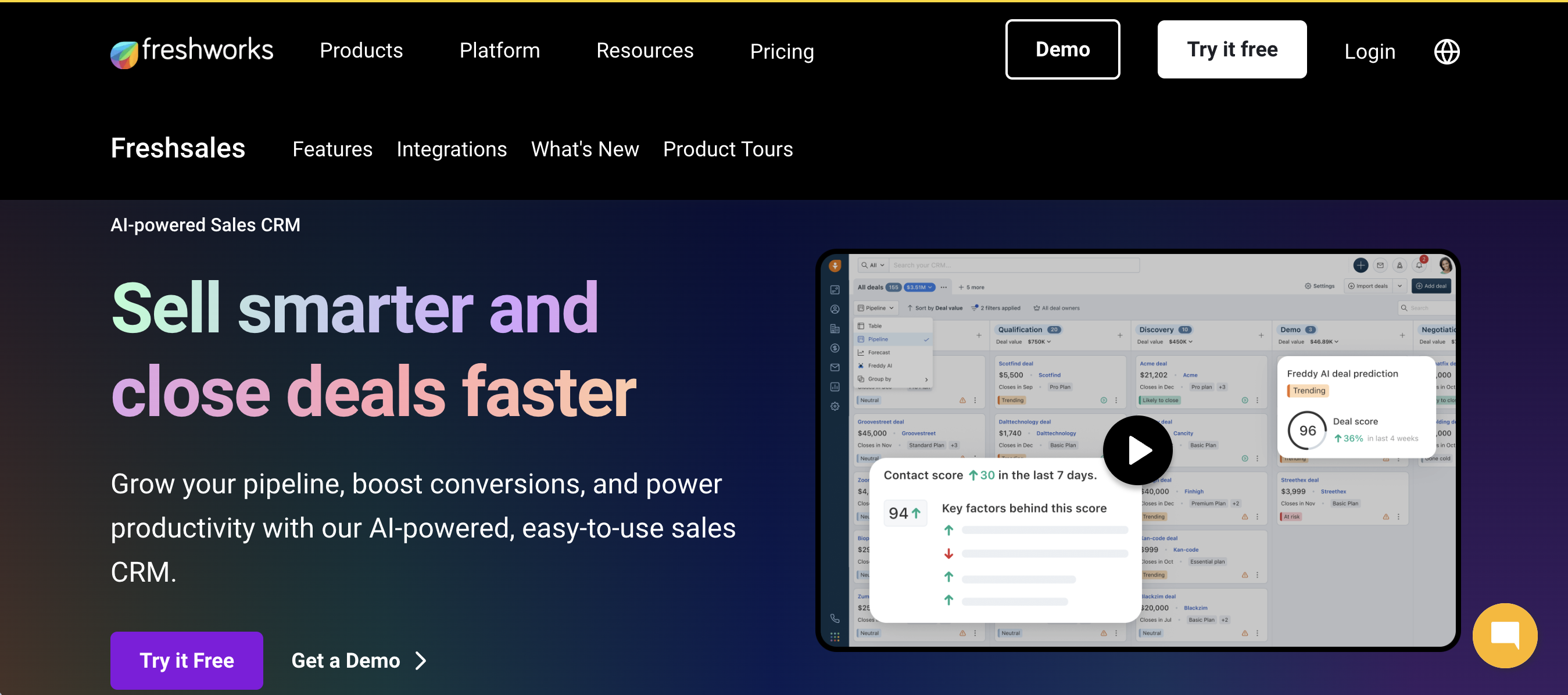
Key features
- Built-in phone, email, and chat capabilities that eliminate the need to switch between multiple communication platforms
- Freddy AI provides intelligent lead scoring, deal insights, and predictive sales forecasting to help teams focus on the most promising opportunities
- Visual sales pipeline management with customizable stages, multiple pipelines, and drag-and-drop functionality for easy deal tracking
Pricing
- Free Plan: $0 for up to 3 users (includes Kanban views, email templates, built-in phone, live chat)
- Growth: $9 per user per month (billed annually)
- Pro: $39 per user per month (billed annually)
- Enterprise: $59 per user per month (billed annually)
- Add-ons: AI Agent Sessions at $100 for 1,000 sessions, Configure Price Quote (CPQ) at $19 per user per month
- All paid plans include a 21-day free trial with no credit card required
Considerations
- Limited third-party integrations in lower-tier plans compared to competitors like HubSpot
- Some users report occasional technical glitches and slower loading times during peak usage
7. Close
Close is purpose-built for high-volume outbound teams that live on the phone. Its integrated dialers, SMS, and email tools keep everything in one platform, cutting down on app-switching and speeding up outreach.

Key features
- Built-in Power Dialer and Predictive Dialer for high-volume calling with automatic call logging and recording
- Integrated SMS and email automation with customizable templates and drip campaigns
- AI-powered Call Assistant that automatically transcribes and summarizes recorded calls
Pricing
Custom pricing available upon request.
Considerations
- Limited marketing automation features compared to more comprehensive CRM platforms
- SMS functionality is restricted to certain countries (US, Canada, UK, and Australia)
8. Insightly
Insightly is ideal for service-based businesses that need to bridge sales and project delivery. Its ability to turn won deals directly into projects helps ensure a smooth handoff between teams while keeping customer data unified.
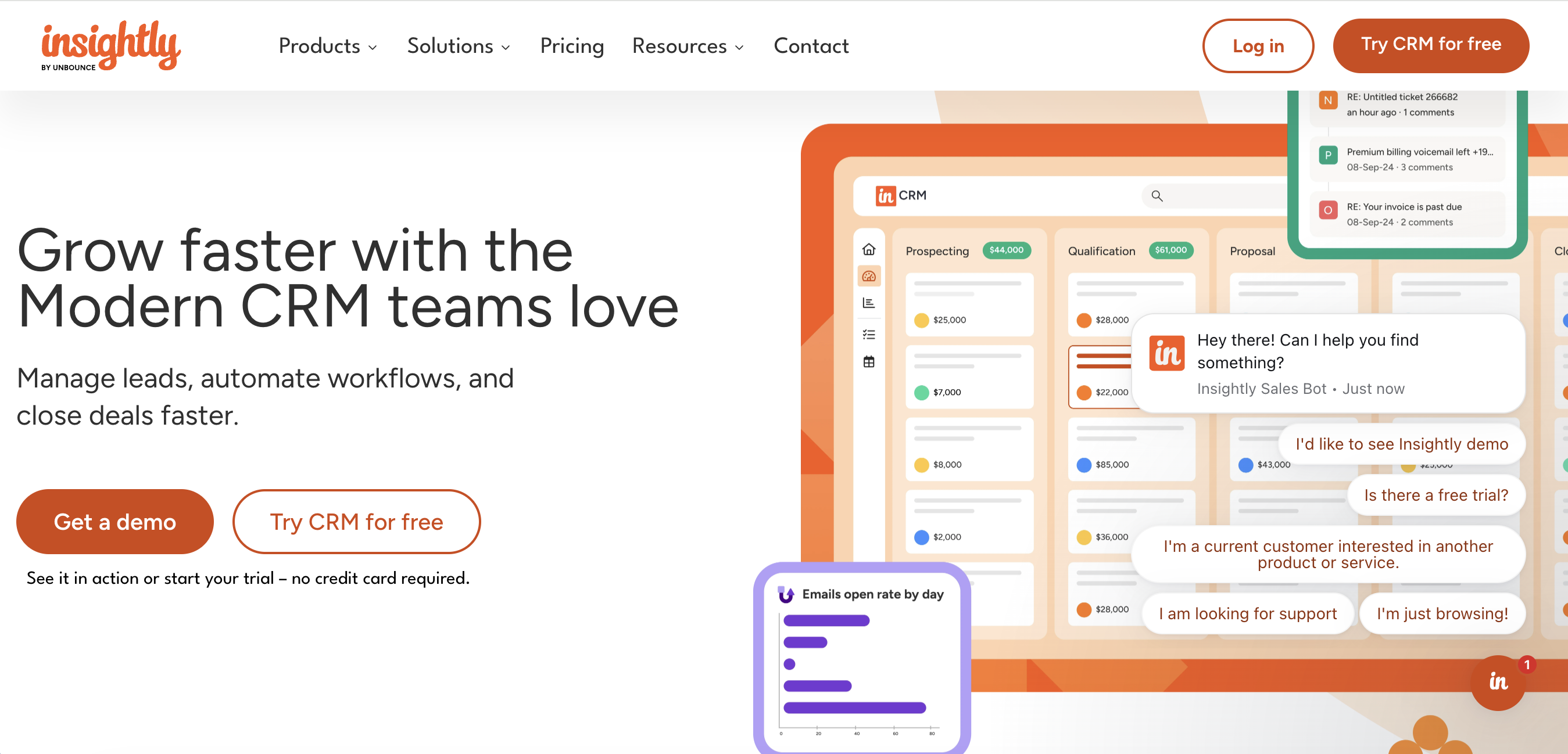
Key features
- Pipeline management with visual kanban boards and customizable deal stages
- Automated workflow capabilities that eliminate repetitive tasks and reduce human error
- Seamless deal-to-project conversion for smooth handoffs between sales and delivery teams
Pricing
- CRM Plus: $29/user/month (billed annually)
- CRM Professional: $49/user/month (billed annually)
- CRM Enterprise: $99/user/month (billed annually)
- All-in-One Plus: $349/month (includes 2 CRM users, 2 Service agents, and 2,000 marketing prospects)
- All-in-One Professional: $899/month (includes 5 CRM users, 2 Service agents, and 10,000 marketing prospects)
- All-in-One Enterprise: $2,599/month (includes 10 CRM users, 2 Service agents, and 20,000 marketing prospects)
- Free 14-day trial available for CRM Plus and Professional tiers; contact sales for an Enterprise trial
- All-in-One plans require a one-time $3,000 technical setup fee for AppConnect
Considerations
- The learning curve can be steep for teams wanting to leverage advanced features and customization options
- Support requires paid add-ons, which increases the total cost of ownership for businesses needing regular assistance
9. Nutshell
Nutshell offers SMBs an approachable CRM with built-in email marketing and pipeline automation. Its focus on simplicity and sales guidance makes it easy for teams to adopt quickly while still delivering meaningful insights.
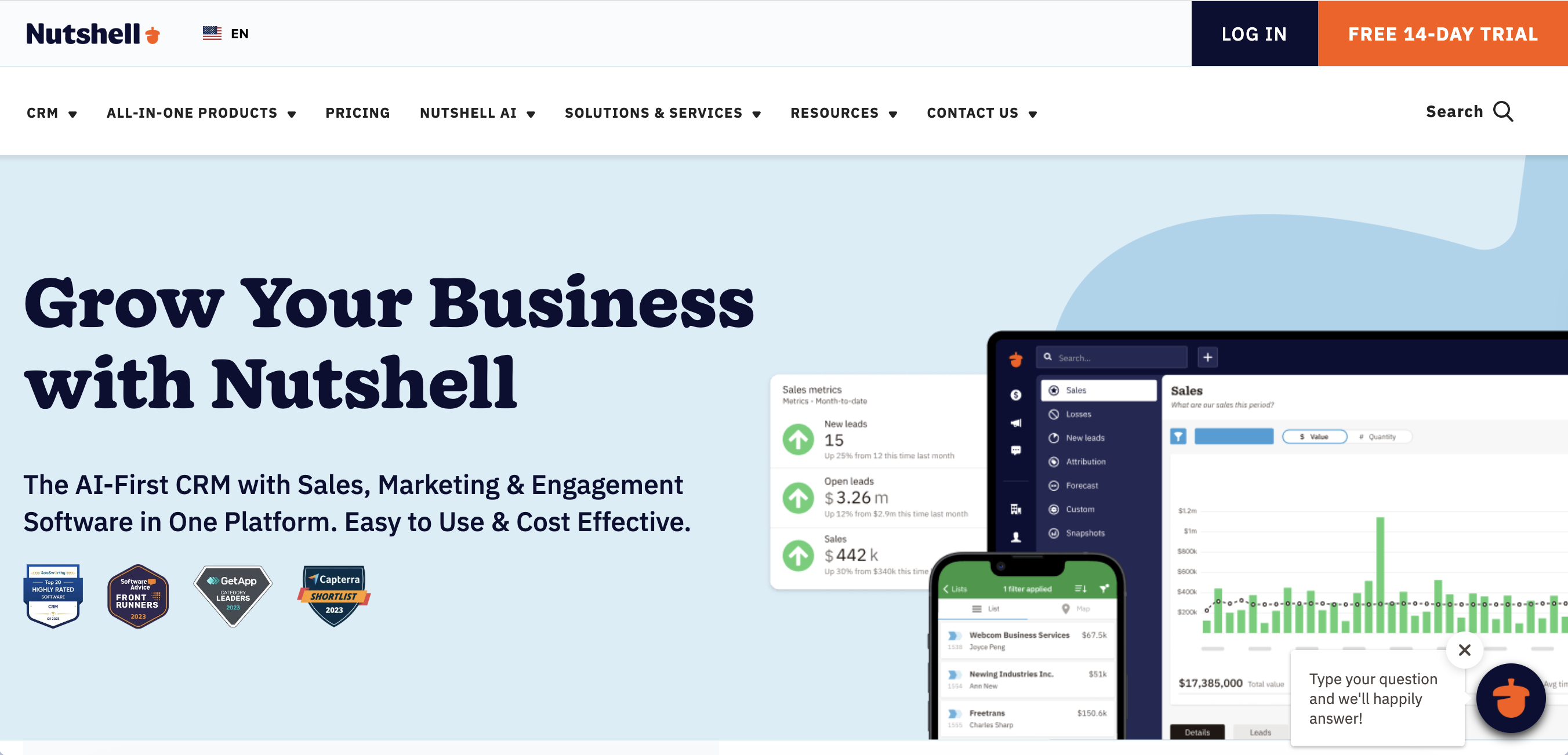
Key features
- Visual pipeline management with drag-and-drop functionality and customizable sales stages
- Built-in “Next Action Selling” methodology that guides sales teams on optimal next steps for each lead
- Integrated email marketing automation with personalized sequences and campaign tracking
Pricing
- Foundation: $13/month per user (annual) or $19/month (monthly)
- Growth: $25/month per user (annual) or $32/month (monthly)
- Pro: $42/month per user (annual) or $49/month (monthly)
- Business: $59/month per user (annual) or $67/month (monthly)
- Enterprise: $79/month per user (annual) or $89/month (monthly)
- Marketing Suite starts free with any Sales plan, with paid tiers for additional contacts
- 14-day free trial available
Considerations
- Limited advanced customization options compared to enterprise-level CRMs like Salesforce
- Mobile app has fewer features than the desktop version, which may limit field sales effectiveness
10. Keap
Keap is a small business management software for those who want sales, marketing, and payments under one roof. Its automation builder and built-in invoicing tools make it especially useful for entrepreneurs and service providers managing lean teams.
Use case: Entrepreneurs and small service providers that want CRM, marketing automation, and invoicing in a single platform to manage lean teams
Key features
- Visual drag-and-drop sales pipeline with customizable stages and automated task assignments
- Powerful automation builder that triggers follow-up emails, appointments, and tasks based on customer actions
- Built-in invoicing, payment processing, and appointment scheduling tools
Pricing
- Full platform: $249/month (includes 2 users and up to 50,000 contacts)
- Additional users: $39/month per user
- Text marketing tiers: Starting at $24/month for 1,000 messages
- Implementation services: Required additional cost with various packages available
- Free 14 day trial with no credit card required
Considerations
- Higher price point may be challenging for very small businesses, especially with mandatory implementation fees
- Basic reporting and analytics capabilities compared to more advanced CRM platforms
11. Teamgate
Teamgate is a straightforward CRM built for B2B teams that want an intuitive, budget-friendly platform. Its lead scoring, SmartDialer, and analytics provide growing sales teams with the essentials they need to stay competitive.
Use case: B2B sales teams seeking an affordable, intuitive CRM with smart dialing, lead scoring, and analytics for growing pipelines
Key features
- SmartDialer integration for seamless calling directly from the CRM with call recording and analytics
- Advanced lead scoring and prioritization to help teams focus on high-quality prospects
- Comprehensive sales analytics software features and forecasting with customizable dashboards for real-time insights
Pricing
- Starter: Free for up to 2 users with basic contact management (up to 500 contacts)
- Team: $39.90/month per user with full email sync, workflow automations, and unlimited contacts
- Growth: $59.90/month per user with advanced analytics, lead scoring, and unlimited users
- Optional onboarding add-ons available for Team and Starter plans
Considerations
- Limited customization options compared to more complex CRM platforms like Salesforce
- Some users report occasional performance issues with larger datasets and slower loading times
12. Copper
Copper integrates directly into Google Workspace, eliminating the need for manual data entry. For teams that live in Gmail and Google Calendar, it offers a frictionless way to manage pipelines without leaving familiar tools.
Use case: Google Workspace–centric companies that want a CRM seamlessly embedded into Gmail and Google Calendar without extra manual entry
Key features
- Visual drag-and-drop sales pipelines with customizable stages and automated workflow triggers
- Automatic data capture from Gmail, Google Calendar, and Google Drive with zero manual entry
- Pipeline email automations and task assignments that trigger when deals move between stages
Pricing
- Starter: $9/month (annually, regularly $12) – 1,000 contact limit with basic Google Workspace integration
- Basic: $23/month (annually, regularly $29) – 2,500 contacts plus task automation and project management
- Professional: $59/month (annually, regularly $69) – 15,000 contacts with workflow automation and bulk email
- Business: $99/month (annually, regularly $134) – Unlimited contacts with email series and custom reports
- All plans include a free 14-day trial with no credit card required
Considerations
- Limited scalability for rapidly growing companies that may eventually outgrow the platform’s capabilities
- Strong dependence on Google Workspace means it’s not ideal for teams using Microsoft Outlook or other email systems
How to choose the right sales management platform
Adopting a new sales platform is a chance to accelerate team momentum — but only if you choose one that solves real challenges. Use these steps to guide your selection:
- Define your pain points: Identify what slows your team down today — pipeline blind spots, messy data, forecasting inaccuracy, or too much admin work.
- Clarify success metrics: Decide what “winning” looks like — faster deal velocity, higher close rates, or improved forecast accuracy.
- Check usability: Prioritize platforms your team will actually enjoy using. A simple, intuitive interface always beats complex tools that gather digital dust.
- Evaluate AI capabilities: Look for platforms with AI-powered lead scoring, forecasting, and content assistance. These features help teams prioritize the right opportunities and act with confidence.
- Look for AI and automation: Choose software that automates routine tasks and surfaces insights, so your team can focus on selling.
- Evaluate integrations: Make sure the platform connects seamlessly with tools you already rely on (email, marketing automation, BI dashboards).
- Test drive with your team: Don’t just peek at a demo — get hands-on with a trial to confirm adoption, fit, and ease of setup.
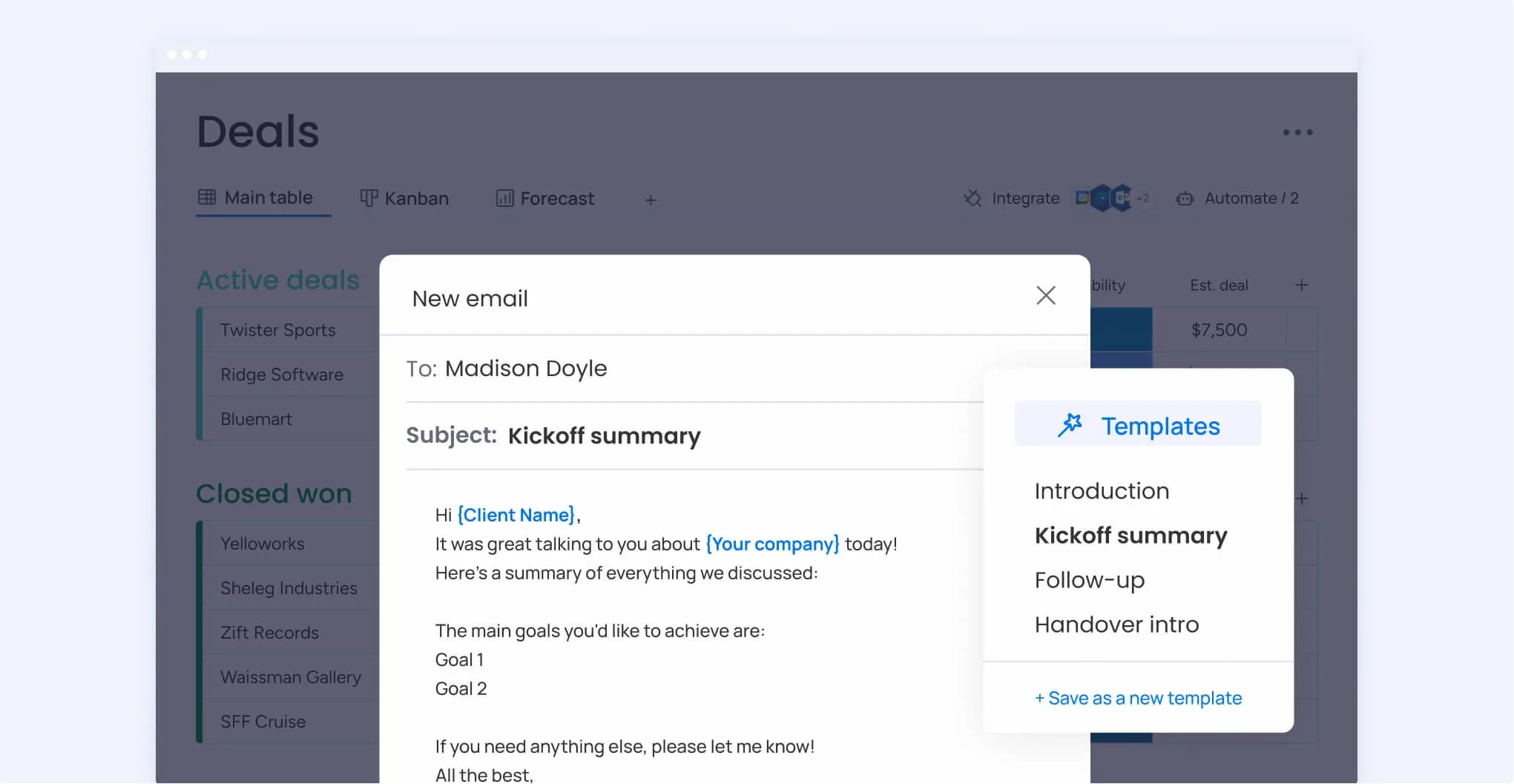
Unlock your potential with an intuitive CRM
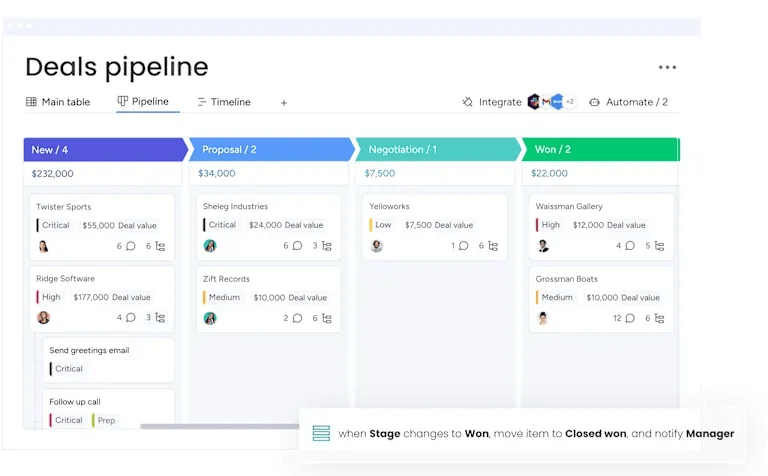
Sales professionals are hired to build relationships and close deals, not to wrestle with clunky software. We believe your CRM should be the team’s best play-caller, adapting to your unique sales process and clearing the path for reps to do what they do best. A tool should work for you, not the other way around.
With monday CRM, we put control back in your hands through visual, drag-and-drop pipelines, AI assistance that recommends next steps, and no-code automations that handle the busywork for you. This frees up your team to focus on strategy and gives everyone a clear, real-time view of the entire sales cycle. It’s all about working smarter, not harder.
When your entire team operates from a single source of truth, they move faster and with more confidence because their tools simply work. When your CRM is this intuitive, reps spend less time on data entry and more time building momentum on deals that matter. That’s how we turn potential into performance and close more deals, together.
Elevate your sales performance
The right CRM transforms how your entire team approaches sales. With monday CRM, sales managers gain the visibility to coach effectively, identifying bottlenecks before they impact revenue. Meanwhile, reps get a streamlined workflow that eliminates the administrative burden that typically consumes up to 65% of their time.
This newfound efficiency creates a compound effect across your organization:
- Accelerated deal velocity: Automated follow-ups and task assignments keep deals moving forward even when your team is focused elsewhere
- Improved forecast accuracy: Real-time pipeline visibility gives leadership the confidence to make strategic decisions based on reliable data
- Enhanced team alignment: Cross-functional collaboration ensures marketing, sales, and customer success deliver a seamless experience at every touchpoint
Build a sales engine that scales
As your business grows, your CRM should evolve alongside it without requiring constant reconfiguration or specialist intervention. With monday CRM’s flexible architecture, you can start with the essentials and expand your setup as your process matures, whether that’s adding new pipeline stages, integrating additional tools, or creating more sophisticated automations.
The platform’s intuitive design means adoption isn’t just possible — it’s inevitable. When your team actually enjoys using their tools, you create a virtuous cycle where better data leads to better insights, driving better results that fuel your company’s growth trajectory. This is how winning teams consistently exceed goals, quarter after quarter.
Try monday CRMFAQs
What is the difference between CRM and sales management software?
The difference between CRM and sales management software is that sales management software is a platform focused specifically on optimizing your sales process, while a CRM is a broader platform that can include sales, marketing, and service functions. Modern platforms like monday.com combine both, giving your sales team a comprehensive solution in one place.
How long does it take to implement a new sales management system?
Implementation can take a few days to several weeks, depending on your team’s size and needs. A flexible platform that adapts to your existing workflow, rather than forcing a new one, will get your team up and running much faster.
Can sales management software help with follow-ups and reminders?
Yes, it automates follow-ups, reminders, and other key communications so your team never misses an opportunity. This ensures every lead gets the attention it deserves without manual effort from your reps.
Is there free sales management software available?
Many platforms offer free plans with limited features, which can work for small teams just getting started. However, a paid platform often provides a much higher return by saving your team significant time and preventing the future hassle of switching systems.
Which industries benefit most from sales management software?
Any industry with a structured sales process—from tech and real estate to manufacturing—benefits greatly from this software. It’s less about the industry itself and more about the need to track leads through multiple stages and align team efforts.
How does sales management software improve team collaboration?
It creates a single source of truth for all customer information, giving everyone real-time visibility into deal history and next steps. This eliminates confusion and aligns the entire team so they can focus on closing deals together.


